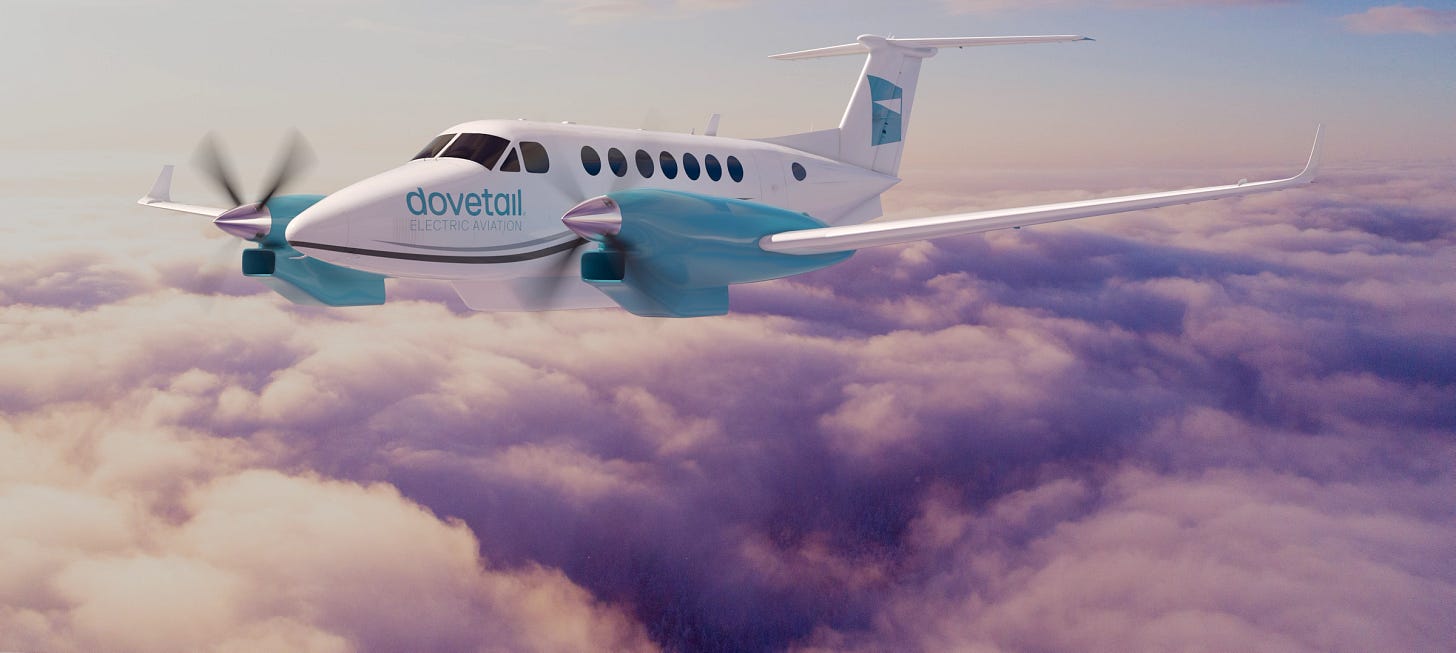Why Dovetail Electric Aviation's retrofitting approach makes pragmatic sense
Starting with hydrogen-electric retrofits with a plan to ultimately develop a clean-sheet aircraft.
Summary
Australia’s Dovetail Electric Aviation focuses on hydrogen-electric retrofitting for existing aircraft, aiming to lower emissions, reduce costs, and enhance sustainability.
Regional Express (Rex) holds a 20% stake in Dovetail. It aims to eventually retrofit its fleet of Saab 340 aircraft, the largest in the world.
Though it will take a few years before converting the Saab 340 is feasible, Dovetail is starting with the popular Beechcraft King Air aircraft.
Dovetail's parent company, Dante Aeronautical, follows a similar strategy in Spain, starting with retrofitting and ultimately aiming to develop a clean-sheet aircraft.
The 2023 Paris Air Show showcased a myriad of next-generation aircraft companies envisioning a future where flights will be powered by electric batteries or by hydrogen.
Among them was Dovetail Electric Aviation, an Australian venture launched in 2020 as a joint effort between Sydney Seaplanes and Dante Aeronautical, a Spanish aerospace and engineering firm.
With a 20% ownership stake from Regional Express (Rex), Australia's regional airline renowned for operating the world’s largest fleet of Saab 340 aircraft, Dovetail also has investments from Spanish airlines Air Nostrum and Volotea.
We caught up with David Doral, Co-Founder and Managing Director of Dovetail Aviation, to delve deeper into the company’s approach.
Dovetail's Elevator Pitch: Retrofitting for Impact
Dovetail's primary focus lies in retrofitting existing aircraft, as David Doral believes that retrofitting is the most effective way to make a meaningful difference in the aviation industry:
“The best way to make an impact this decade as opposed to ten years from now is to retrofit existing airframes.”
According to Doral, this offers numerous advantages, including lower emissions, reduced operating costs, quieter operations, and enhanced sustainability.
By focusing on the most popular and widely used airframes in the small passenger category, Dovetail aims to transform these aircraft into hydrogen-electric-powered models.
In addition to Rex, Dovetail has agreements with South Korea’s MintAir (for the delivery of ten retrofitted aircraft that will be used for commuter routes) and aircraft leasing company Monte.
Exploring Hydrogen-Electric Technology
Dovetail works with hydrogen-electric technology, where a hydrogen fuel cell powers an electric motor. This approach allows for extended range capabilities, crucial for airlines like Rex:
“If you look at the network of Rex Airlines in, for instance, New South Wales, most flights fall under the 500 km mark. Some could be as short as 200-300 km and a typical flight will be 400 km. That’s something that can be done with an electric power plant and hydrogen.”
In comparison, Doral believes that a retrofitted Cessna Grand Caravan powered solely by today’s batteries may only achieve only a 100 km flight range — significantly shorter than what airlines are looking for.
Dovetail's retrofitting process involves integrating their own technology with components from various suppliers.
For instance, the initial choice for the motor comes from magniX, a leading electric propulsion system provider.
Additionally, Dovetail has signed an agreement with Hyundai Motor Group's HTWO division at the Paris Air Show to supply hydrogen fuel cells, leveraging Hyundai's expertise as one of the world's biggest hydrogen car manufacturers.
By combining their proprietary technology with strategic partnerships, Dovetail aims to optimise the performance and efficiency of their retrofitted aircraft.
Challenges and Future Plans
Dovetail is actively retrofitting the popular Beechcraft King Air, which boasts over 3,000 aircraft still in service and can accommodate 8-15 passengers, depending on the model.
However, retrofitting the larger 30-38 seat Saab 340 — the backbone of Rex’s fleet — is expected to take a few more years.
This aligns with industry estimates for retrofitting larger aircraft with hydrogen-electric powertrains. Companies like ZeroAvia plan to first certify powertrains capable of flying 9-19 seat aircraft by 2025, followed by powertrains for 40+ seat aircraft around 2027.
One significant challenge in adopting hydrogen-electric technology for aviation is the need for airports with hydrogen infrastructure.
While airports such as Newcastle and Wollongong are actively exploring the establishment of hydrogen hubs, providing hydrogen infrastructure to remote inland airports in Australia presents a more complex obstacle.
One option would be to produce hydrogen on-site. Doral says that it depends on how fast electrolysis technologies are going to progress.
Dante Aeronautical — a Spanish connection
Not only does David Doral serve as the Managing Director of Dovetail, he also holds a directorship at Dante Aeronautical, one of Dovetail's parent companies based in Spain.
Following a similar path to Dovetail in Australia, Dante focuses on retrofitting aircraft. It has started with small planes like the Casa C212, a versatile military and cargo aircraft that can also be adapted for passenger transport.
A glance at the Dante Aeronautical website shows a picture of a completely new plane. Doral confirms that the company's roadmap does ultimately lead to the development of a clean-sheet aircraft.
However, he emphasises the need to first master the integration of new power plants into existing airframes:
“Once we know that we can make sense of those technologies from an economical and technical point of view, we can then jump into the development of a brand new aircraft. By then we will have significantly reduced the risk.”
Our Take
In an industry rife with grandiose claims about the capabilities of next-generation aircraft, Dovetail and Spanish parent company, Dante, have opted for a quieter, methodical approach.
Their journey commences with retrofitting, a feasible and cost-effective endeavour that can be undertaken immediately. With thousands of small regional aircraft — such as the King Air — still in operation, these planes can be given a new lease on life through the integration of hydrogen-electric powertrains.
While retrofitting may not radically reduce the sector’s emissions, it positions both Dovetail and Dante to scale up their operations once the technology matures.




